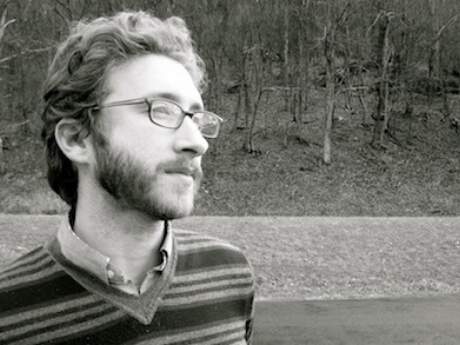New American Poets
New American Poets: Joshua Corey

from Severance Songs
2.3
That night the white moon's sunlit acre grew
(she said in his heart don't write this)
filling the bowl of our town with its shavings
(she said wait, don't tell me these stories)
and the close-built houses looked blank as their doors
(there's a window in my chest where I saw you)
while a dog went snuffling through leaf piles
(she pressed her hand to the hard cool pane)
pricked head and ears and stiffened at nothing
(trying not to imagine glass that turns to water)
lifted his leg then snorted trotting on
(if I say it out loud does that mean it can't happen)
so toward you then a like mind might wander
(Imparadised in one another's arms Satan sobbed)
Severance Songs" (excerpt) by Joshua Corey. All rights reserved. Reprinted with the permission of the author.
I wanted to use this opportunity to call attention to a younger poet, to a less canonical poet; but if we are going to talk about influences on my own writing I am forced to admit that Wallace Stevens is the single most important figure. What particularly fascinates me now is how the arc between early and late Stevens describes the arc of my own career (better: careen) through poetry. The early Stevens, my first love, is the textural Stevens of Harmonium, the Stevens of outlandish titles and carefully cadenced nonsense (nearsense?): "Chieftain Iffucan of Azcan in caftan // Of tan with henna hackles, halt!" ("Bantams in Pine Woods"). I say "textural" to mean a poetry that apprehends the reader at its highly evocative musical surface, that takes hold of you many beats before your reason can assimilate the poem's argument. I have an immediate and visceral affection for this kind of poetry wherever I find it (Lucie Brock-Broido, Barbara Guest, Dan Beachy-Quick, for example), and I'm still drawn to the humor, exotic vocabulary, and sheer élan present in even one of the more melancholy Stevens poems in this style, "Loneliness in Jersey City." Here is an excerpt:
The deer and the dachsund are one.
Well, the gods grow out of the weather.
The people grow out of the weather;
The gods grow out of the people.
Encore, encore, encore les dieux. . .
The distance between the dark steeple
And cobble ten thousand and three
Is more than seven-foot inchworm
Could measure by moonlight in June.
And yet it's the later Stevens of "An Ordinary Evening in New Haven" and "Notes Toward a Supreme Fiction" who may have had the most profound effect on my development as a poet. This is the conceptual Stevens, the Stevens of the long breath, who uses his rhythmic, estranging language to meditate, to dream, to think beneath the radar of ordinary discourse. It was this Stevens who made it possible for me to appreciate highly conceptual poets like Lyn Hejinian and Michael Palmer when I first encountered their work. It was this Stevens that persuaded me that an epic of imagination, of the growth of a mind within history, might be the kind of epic yet worth writing. And yet of course the distance between texture and concept in Stevens is never very great; they flow into and out of each other, "form gulping after formlessness," always something rather than "nothing there to roll // On the expressive tongue, the finding fang" ("The Auroras of Autumn"). But these are the two pincers of the single tool with which I've come to try and grasp language and its never to be taken for granted cousin, the meaningful.


